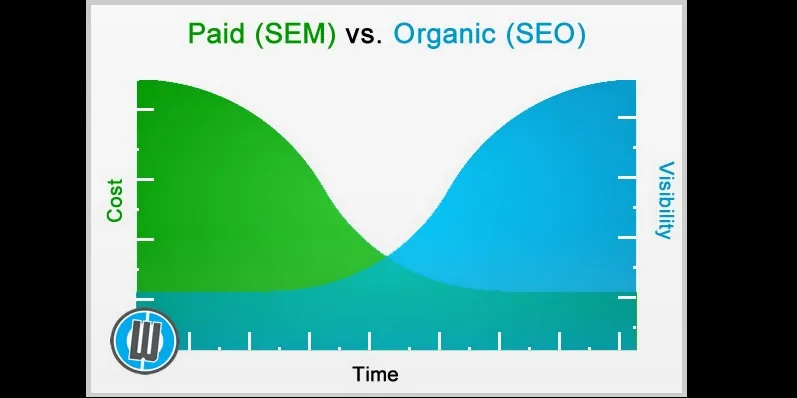

Why brands prefer SEO over other digital marketing strategies
Have you also incorporated SEO into your digital marketing strategy? No! Here are few tips why brands prefer SEO over other digital marketing strategies.
Did you know that Google receives over 65,000 searches every second of every day? Imagine if even a fraction of those searches directed traffic to your website. That’s where search engine optimization can help you.
In simple layman’s term, search engine optimization (SEO) is the process through which your website can be found in a search engine. The idea behind SEO is to give more visibility to a website by improving its search engine ranking. More visibility means more traffic.
To ensure greater visibility, the website must rank high in the search engine result pages (SERPs). Around 90% of people look at only the first page of search engine results. This means that you need to fully incorporate SEO into your marketing strategy to get the best conversion rates for your business. In fact, SEO experts say that in order to succeed as an entrepreneur, SEO needs to be one of the top priorities.
The difference between other digital marketing strategies
With the growth of online marketing, companies are realizing the importance of SEO and how crucial it is for their campaigns. People are more likely to end up on a particular webpage via a search engine rather than getting there directly. But what makes SEO better than say SMO (social media optimization) or PPC (pay per click)?
SMO
As the name suggests, SMO or social media optimization is all about increasing a company’s presence through social media platforms. This may include Facebook, Instagram, Twitter, LinkedIn, Snapchat, or other platforms.
While SEO is all about driving traffic through the search engines, SMO uses social media to drive traffic. The idea is to increase traffic to your website by developing profiles on social media that can be shared, liked, and viewed by others.
When SMO is compared to SEO, its traffic is less steady. At times, SMO content may be attractive on the surface, but an in-depth read may lead to traffic bouncing (leaving quickly). Hence, SMO’s success is very short-lived as compared to that of SEO, which tends to be more long-term.
PPC
PPC or pay-per-click is closely associated with SEO, and simply put it means you pay for each click. In this model, an advertiser pays a publisher when their ad is clicked on. With this type of digital marketing, the search engine is paid to gain more visibility.
The results are displayed on top of the organic search results. According to Search Engine Journal’s 2017 report, PPC is an essential part of digital marketing, with 42% saying that most of their digital marketing budget is spent on PPC and display ads.
What PPC lacks in terms of long-term feasibility, SEO makes up for. SEO is an authority when it comes to finding solutions to your problems. And compared to PPC, SEO brings better quality traffic leads.
How does SEO work?
If you want your business to work, SEO should be an integral part of your marketing strategy.
Search engines have crawlers or spiders that crawl through content on a webpage. This information is then stored and indexed in a giant database, which is then searched when you enter keywords or phrases into the search engine.
With so many web pages, obviously, a lot of search phrases will overlap. In these cases, a search engine uses complex mathematical algorithms to guess which website better fits what the user is searching for. This algorithm looks at different aspects of a web page like title tags, meta tags, keyword density, links, and more.
So how can you increase your website’s prominence in search engine results?
1. Optimize your site for keywords. Make sure that the keyword density ratio is 2-3% of your web page
2. Get backlinks from other relevant websites
3. Decrease the load time for your web pages
4. Prioritize mobile friendliness
5. Get SSL certificates (https)
6. Consider getting an AMP (accelerated mobile pages)
7. Produce high-quality content
Tools to Improve SEO
There are many tools available online to help you improve your website’s SEO:
1. Google PageSpeed Insights - To check the usability and speed of your website on multiple devices
2. Moz Local Listing Score - To check how your business looks online
3. Pro Rank Tracker - Used for rank tracking and reporting
4. Open Site Explorer - For a comprehensive link analysis
5. QuickSprout Website Analyser - For a complete website analysis
Benefits
One of the biggest benefits of SEO is the minimal cost. As compared to PPC, organic listings are essentially free. More than a financial investment, SEO requires a time investment.
A 2016 study by Ascend2 quoted by Marketing Dive stated that 82% of marketers feel that SEO’s effectiveness is on the rise.
It is important that your website and content can be easily found if you want to gain a larger audience. SEO may not give you immediate results, but the moment it is implemented, there will be a steady increase in traffic.

Image Source: Quick Sprout
An increasing number of people do an online search before buying anything. In fact, Hubspot found that 81% of shoppers do an online search before buying anything online. It’s not just for B2C, SEO has proven successful even for B2B marketing.
When it comes to return on investment (ROI), SEO results are trackable and quantifiable. For every 1000 clicks, 4% of visitors from SEO convert, compared to 2% from paid ads.
When you appear on the first page of search engine results, not only do you get more website visitors, but it also increases your credibility. It’s logical that if Google, Yahoo, or Bing trust you, consumers will too.
Takeaways
SEO offers better value in search marketing compared to other strategies. For any digital marketing strategy campaign, SEO is also vital due to its longevity. Even after years, a webpage is accessible on search engines. And for consumers, online search before visiting a store is a given these days. If you are an e-retailer, a high-quality SEO strategy will play a huge role in your success.
Contrary to what people may say, SEO is here to stay. Search engines are easy tools to navigate the complex world wide web. By just typing in a few keywords, they give you all of the information you seek in the matter if seconds.
Conclusion
Businesses are realizing the benefits of SEO, and it is gaining ground as a digital marketing strategy. Everyone is taking advantage of it, including your competitors. It can bring a huge traffic to your website. SEO doesn’t work overnight, but it definitely has long-term benefits. And guess what? It really is affordable.
Have you also incorporated SEO into your digital marketing strategy? If so, do you have any questions or tips to share? Let us know in the comments below.






